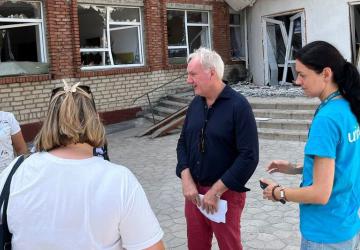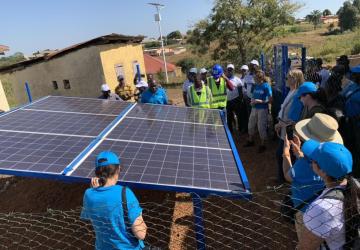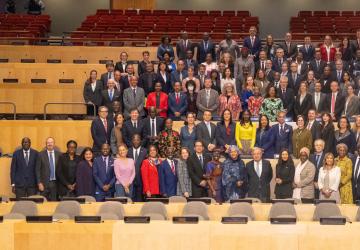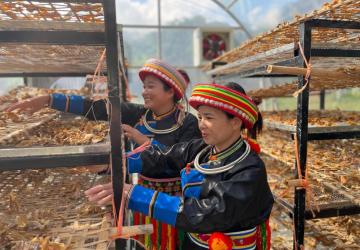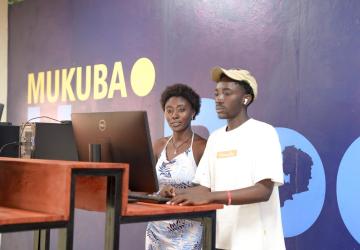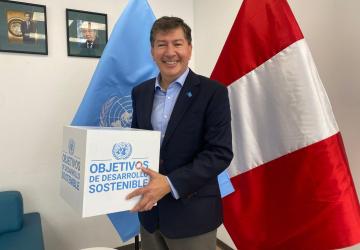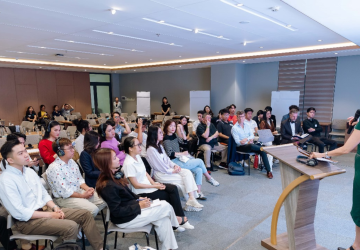Planning for the Future, Listening to the People of Djibouti

Djibouti is a melting pot of cultures, languages and identities. This relatively small but important country is a gateway to the Horn of Africa and indeed, a guidepost for larger countries on how to tackle the most definitive challenges of our time- from climate change to crisis, from security to stability.
Over the past few years, our United Nations country team here has played a critical role in ensuring that even in complex circumstances, Djiboutians are not left behind in the pursuit of equitable and sustainable development. This has been evident in the response to the drought in 2022-23, digitalization of schools, strengthening the social protection system, the support provided to manage the huge migration movements through Djibouti and supporting young people to create their own companies, for example.
With eyes on the future, the UN and the Government of Djibouti are now jointly designing the new Sustainable Development Cooperation Framework for 2025-2030. The implementation of this Framework will sustain Djibouti towards achieving the Sustainable Development Goals (SDGs). In the next five years, the UN team will be redoubling our efforts with the Government to eradicate poverty in the country and forge a solid path to 2030. It is possible – and we will put all our resources and passion into achieving it.
The Framework aligns with the National Development Plan “Djibouti ICI 2022-2024”, the government’s “Vision Djibouti 2035” which maps out the country’s objectives for 2035, and the UN Horn of Africa Prevention Strategy.
The starting point for this process has been to hear from Djiboutians what their priorities are, what are possible solutions, and how the UN can support in achieving them.
Leveraging my role as Resident Coordinator, the UN team and the Ministry of Foreign Affairs organized nine consultations with a wide array of stakeholders earlier this year. We consulted with youth, women’s groups, academia and researchers, the private sector, civil society organizations, the international community and financial institutions, and parliamentarians. We also organized two consultations in the rural areas: one in the northern coastal town of Tadjourah and one in the southern in-land region of Dikhil.

In each of these consultations the floor was given to the participants to talk. And they had a lot to say!
Emerging from these discussions is a vivid picture of the Djibouti of the future- the aspirations of its people matched with the vision of its institutions.
Here are five avenues that participants highlighted that can help turn the tide for the country:
Firstly, ensuring food security and building resilient agricultural systems. In the rural areas of the South, investing in the agriculture sector is the clear priority. The region has been severely impacted by successive droughts since the eighties, which have been exacerbated by climate change. Yet communities still aspire to grow local produce. This could add much more to the national GDP as well as address many societal problems. Indeed, with greater support, such as the UN’s efforts through the Food and Agricultural Organization’s “Reinforcing vegetal and animal productions in Djibouti” project building the capacities of local producers, agro-pastoralists and local cooperatives, communities can produce more food. This will help reduce Djibouti’s reliance on neighboring countries’ food exports. This shift towards self-sufficiency could also create jobs for rural youth, addressing unemployment and revitalizing rural areas, thus slowing down the continuous exodus to the capital.
Secondly, diverse jobs and economic empowerment. Djiboutian youth stressed on the need for more jobs that are tied with the digital transformation that the entire region is experiencing. A professional education better oriented to the labor market as well as closing digital gaps with efficient andaffordable access to the internet, are critical needs for young people.
In Djibouti, the UN has helped transform business ideas into formal registration for MSMEs, supporting entrepreneurship and employment in diverse sectors, including for persons with disabilities, Through the support of the UN Development Programme’s "Rising Djibouti" initiative, Femtic, a civil society organization has trained young women in digital literacy and made them ready for jobs.
Thirdly, people in remote areas requested to scale up basic infrastructure- including access to clean water, electricity and roads. In both the North and the South, access to water is crucial. Reinforcing infrastructures such as roads to facilitate commercialization of local products, will be vitalto open new economic opportunities between rural and urban populations. As such, in 2022, the UN, through the UN Children’s Fund (UNICEF) and FAO projects, has helped construct and rehabilitate dozens of wells and water basins in rural areas to increase access and management of water and improve irrigation systems to strengthen local producers.
Fourthly, private sector wants to be more competitive and expand business opportunities. To do so, they request to scale up affordable and basic infrastructure and simplify administrative procedures that advance ease of business.

Finally, Djiboutian women are demanding social emancipation, not only economic. They want to be more present in decision-making positions both in formal power structures but also in traditional spaces. They want access to all jobs, and to abolish assumptions that some jobs are “just for men”. For this kind of social transformation to happen, civil society requested to be officially recognized and play their part in sensitizing communities to positive behaviour change. The UN in Djibouti has been helping lead the conversation, organizing a colloquium called “Digit’ALL : Innovation and Technology for Gender equality”, in close collaboration with the Djiboutian Government. The event gathered young female Djiboutian civil society leaders and entrepreneurs along with experts from specialized governmental institutions and the UN, discussing the way technology is shaping the future of work and the challenges and opportunities young people face today with new technologies.
The Djibouti of the future cannot be fully realized without the participation of international financial institutions bringing in much-needed investments and academia working hand-in-hand with policymakers to shape evidence-based decisions. Parliamentarians are relying on the UN to continue sharing successes and lessons from our various programmes, setting the tone for greater transparency and accountability.
With the Summit of the Future taking place later this year, Djiboutians are clear in their ideas of how their country can leave poverty behind and help the region leapfrog to new heights. The UN has heard them; we will deliver and ensure we continue listening to them.
This blog was written by Mr. Jose Barahona, the UN Resident Coordinator for Djibouti. For more information about the UN's work in Djibouti, please visit djibouti.un.org.


